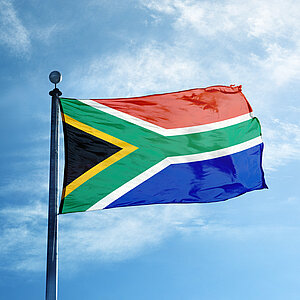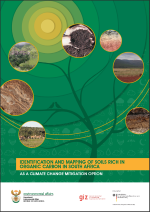Climate Support Programme (CSP) - Phase III
South Africa is one of the 20 countries in the world that emit the greatest volumes of CO2. The project supported the South African Department of Forestry, Fisheries and the Environment (DFFE) in the development and implementation of its national climate policy in the fields of governance, mitigation, adaptation policy and MRV (Measuring, Reporting and Verification). The DFFE was also strengthened in its role of encouraging other ministries and the private sector to implement climate-relevant projects. This support helped the DFFE to implement its climate policy more quickly, more effectively and in a knowledge-based manner. In this way, the project supported the transformation to a lower-carbon economy and a climate-resiliant society. The successful further development and implementation of its national climate policy is a prerequisite for South Africa if the country is to continue to play a prominent and constructive role in international climate negotiations.
- Countries
- South Africa
- IKI funding
- 18,000,000.00 €
- Duration
- 02/2017 till 03/2022
- Status
- completed
- Implementing organisation
- Deutsche Gesellschaft für Internationale Zusammenarbeit (GIZ) GmbH
- Political Partner
-
- Department of Forestry, Fisheries and the Environment (DFFE) - South Africa
- Implementing Partner
-
- Council for Scientific and Industrial Research (CSIR) - South Africa
- South African National Biodiversity Institute
- University of Cape Town - South Africa
State of implementation/results
- Project completed.
- The establishment of the Green Economy Cluster Agency in Mpumalanga was financially supported by CSPIII via the non-governmental organisation (NGO) GreenCape.
- Project launched to identify marine and coastal carbon sinks (so-called "blue carbon sinks").
- Supported the process of developing green procurement guidelines.
- In the area of ecosystem-based adaptation (EbA), the action plan, as well as a map for prioritising EbA activities in South Africa, and thus the operationalisation of the EbA strategy was supported.
- Support for a project to determine the Forest Reference Level (FRL) and the Forest Reference Emission Level (FREL) with regard to the implementation of REDD+ measures.
- The reporting regulations for greenhouse gas emissions are being revised, especially to enable reporting from company level to facility level.
- Project to analyze the climate awareness of the South African population and the education sector successfully completed.
- Project to develop Sector Jobs Resilience Plans (SJRP) to mitigate the negative effects of climate change on the labour market has been completed and the plans are in draft form.
- Project on the impact of the corona pandemic in the waste sector was finalised.
- The Organic Waste Management Guide (AWT guide) is online as a web-based guideline and will help municipalities to select waste management options to minimize adverse environmental impacts, including greenhouse gas emissions.
- The CSP has helped the Cities of Johannesburg and Polokwane to develop a strategy for the renewal of its bus fleet. The aim was to reduce operating costs and save GHG and other emissions in the future.
- The process of commenting on the adaptation strategy was completed with the support of CSPIII and the adaptation strategy was approved by the Cabinet.
- In the tourism sector, climate risk and vulnerability analyses were conducted and a plan for mitigating vulnerabilities was developed.
- Based on a mapping of priority regions for adaptation measures, the development of a concept for financing disaster risk reduction measures was launched.
- Support to the National Planning Committee (NPC) in the consultation of their just-transition process in three provinces.
- Support of a training of 60 bankers from the private sector on climate risk analysis.
- Start of training of 100 agricultural experts on Climate Smart Agriculture in three provinces.
- Implementation of trainings within the framework of the Local Government Climate Change Support Programme (LGSP) at municipal level in 65 municipalities from 17 districts (mitigation and adaptation as well as climate financing). The fourth phase has been completed and a fifth phase is planned.
- Preparation of the 4th Biennial Update Report (BUR).
- Development of the final draft of the post-2020 mitigation architecture.
- Support a project to calculate carbon budgets and reduction targets in different sectors (Sectoral Emission Targets - SETs).
- Stakeholder consultations on the draft South African Climate Change Bill.
- Support in the preparation of the Low-Emission Development Strategy (LEDS).
Latest Update:
08/2024
Project relations
Legend:
The link has been copied to the clipboard











